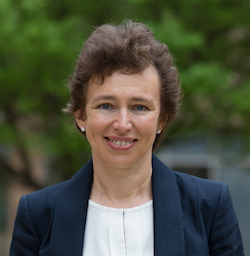 Tatiana Erukhimova to Receive the AAPT 2024 David Halliday and Robert Resnick Award for Excellence in Undergraduate Physics Teaching
Tatiana Erukhimova to Receive the AAPT 2024 David Halliday and Robert Resnick Award for Excellence in Undergraduate Physics Teaching
FOR IMMEDIATE RELEASE
College Park, Maryland, United States, February 28, 2024—The American Association of Physics Teachers (AAPT) has announced that Tatiana Erukhimova will receive the 2024 David Halliday and Robert Resnick Award for Excellence in Undergraduate Physics Teaching. This award is given in recognition of contributions to undergraduate physics teaching and awardees are chosen for their extraordinary accomplishments in communicating the excitement of physics to their students. John Wiley & Sons is the principal source of funding for this award, through its donation to the AAPT.
The citation says, “For her profound impact in the area of undergraduate physics education through the development, implementation, and sharing of innovative and inspiring methods for teaching physics in the classroom, lab, and in a range of wildly unexpected spaces, Dr. Tatiana Erukhimova is hereby named as the recipient of the 2024 David Halliday and Robert Resnick Award for Excellence in Undergraduate Physics Teaching.”
Erukhimova is Instructional Professor and inaugural holder of Marsha L. ’69 and Ralph F. Schilling ’68 Endowed Chair in the Department of Physics & Astronomy, Texas A&M University. She received her PhD from the Russian Academy of Sciences in 1999 and joined Texas A&M University in 2001. Her approach to teaching can best be summarized by her 2018 keynote presentation at Texas A&M’s Transformational Teaching and Learning Conference titled: “It’s not business, it’s personal. Teaching large classes, one student at a time.” These words describe Erukhimova’s sincere interest in the individual student and her investment fostering a strong sense of community with her students.
Regarding her selection for this award, Erukhimova said, “Over the years, I have learned how important it is to make every class interactive and memorable. How many of the students will consider my introductory physics class a highlight of their time here at Texas A&M? How many of them will remember it 20, 30, 40 years later? If there are quite a few, I couldn’t imagine a better reward.”
The culture of Erukhimova’s classrooms is one of engaged, communal learning supported by innovative and research-backed pedagogy. She forms a community of mutual support where all students are expected to help each other learn. For content delivery, she uses a mix of engaging lecture, scaffolded problem-solving, peer instruction with in-class questions, and experimental demonstrations almost every day. Her courses personify the active learning encouraged by recent research. Students must be awake, engaged, and thinking at all times. The outcome of this, beyond students who are excited to be in class each day and courses which fill up long before other instructors, is students who learn and perform better in their courses.
Erukhimova’s passion for student learning, combined with excellent classroom instruction, has earned her many awards throughout the years, including the Presidential Professor for Teaching Excellence in 2017, University Professor for Undergraduate Teaching Excellence (2021), American Physical Society Fellow (2019), The Nicholson Medal from the American Physical Society (2023), and multiple Association of Former Students awards (a high honor for faculty at Texas A&M).
Through her mentoring, Erukhimova has had a significant impact on students beyond her own classroom. In October 2014, she gave a series of presentations on effective teaching practices open to all graduate students in her department. Since then, she has been a mentor and advocate for graduate students who have opted to pursue instructional faculty positions at universities, offering them resources and materials, guidance and suggestions on course structure and pedagogy, and being an open ear and perspective for continuing advice.
In addition to her exceptional work in formal classes, Erukhimova has expanded and created multiple informal physics outreach programs designed to give students invaluable experiential learning opportunities beyond the classroom. Her signature program, Discover, Explore, and Enjoy Physics and Engineering (DEEP), created in 2012, involves undergraduate students working throughout the year in small teams led by graduate physics students to design and build interactive physics demonstrations. Then the students show them at the outreach events. These demonstrations become their legacy here at Texas A&M; some of them become part of the formal curriculum. The DEEP alumni started similar programs at Rice University and the UT-Austin.
Hundreds of student volunteers participate in numerous outreach events that she organizes. The Texas A&M Physics & Engineering Festival, held each spring, attracts thousands of visitors from all over Texas and beyond. She also conducts physics shows for dozens of school groups each year. Erukhimova and the teams of students take physics to local community festivals and football games and have developed online videos for use in K-12 education (Real Physics Live). Her short videos for social media promoting physics experiments to people of all ages garnered almost a billion views over the past few years. Research studies conducted by Erukhimova and her collaborators have shown the positive impacts of facilitating these programs on developing students STEM identity and sense of belonging, as well as on the development of important career skills such as communication and teamwork.
About the Award
The David Halliday and Robert Resnick Award for Excellence in Undergraduate Physics Teaching was established as the Excellence in Undergraduate Teaching Award in 1993. It was renamed and substantially endowed in 2010 by John Wiley and Sons. Named for David Halliday and Robert Resnick, the award recognizes outstanding achievement in teaching undergraduate physics.
About AAPT
AAPT is an international organization for physics educators, physicists, and industrial scientists—with members worldwide. Dedicated to enhancing the understanding and appreciation of physics through teaching, AAPT provides awards, publications, and programs that encourage practical application of physics principles, support continuing professional development, and reward excellence in physics education. AAPT was founded in 1930 and is headquartered in the American Center for Physics in College Park, Maryland.
For more information: Contact David Wolfe, Director of Communications, dwolfe@aapt.org, (301)209-3322, (301)209-0845 (Fax)

